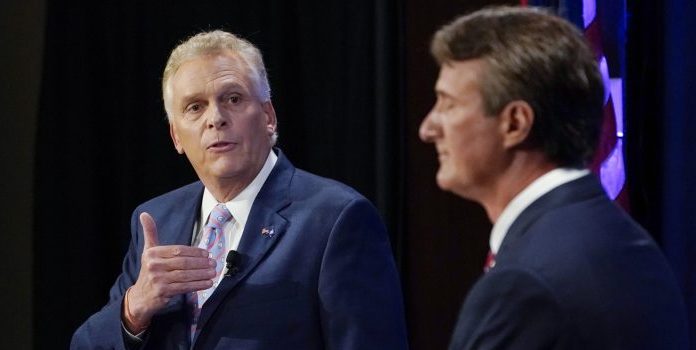(Coleman Hopkins, Headline USA) The ongoing, nationwide controversy around the inclusion of Critical Race Theory topics in public school curricula is driving grassroots activism from fed up parents across the country.
The issue’s political potency will face its biggest test yet next month, when Republican Glenn Youngkin hopes to reclaim Virginia from the clutches of former Democrat Gov. Terry McAuliffe in the state’s upcoming gubernatorial race.
In recent months, CRT and other ideological education issues have spurred new levels of engagement by parents in affluent Northern Virginia counties like Loudoun and Fairfax.
Last week, several contentious education topics came up during an Alexandria debate between the two gubernatorial prospects.
Youngkin took issue with McAuliffe for vetoing a 2017 bill to democratize education decisions by empowering parents during his 2014-2018 term as governor. The Republican hopeful suggested that these types of bills are necessary in light of recent controversies over the content being taught in schools.
Only last month, Virginia schools were forced to remove sexually explicit material in the libraries of public schools that parents found offensive.
McAuliffe, who is seeking a second but non-consecutive term as governor, criticized Youngkin for his position on education, both as it relates to CRT and to the availability of schools to provide explicit content to students.
The former governor then went a step further by lamenting that parents in the Commonwealth are attempting to exert influence on their children’s curriculum.
McAuliffe stated that he does not “think parents should be telling schools what they should teach” and should defer to teachers and administrators.
The implicit idea expressed in that statement—that parents can put money into Virginia schools, but cannot shape or oversee their actions—has already energized conservatives who believe that this issue could be decisive in what appears to be a close race this fall in a typically dark blue state.
Conservatives have picked up the comment and amplified it far and wide — and voters in Virginia are paying attention.
Paul Scott, a Youngkin supporter and Republican activist in Virginia said that he believes McAuliffe’s statement was a blunder and a potential benefit to Youngkin.
“People say that a gaffe in politics is a situation in which a person gets caught telling people what they really think about an issue, and I agree,” Scott said.
“… I think this [statement] is a huge liability for McAuliffe—both because parents are sick of the partisanship in the classroom and because, I think, Virginians, like many Americans, are fed up with institutions thinking they can run on autopilot without input from the people who subsidize them,” he added.
There are reasons to suspect the education issue may move voters in Youngkin’s favor.
In recent months, parents in Loudoun flocked to school board meetings to express their concern and displeasure with its decision to suspend teacher Tanner Cross when he used his First Amendment rights to criticize the district’s transgender policies.
Nationally, the issue of CRT in schools is a loser for progressives. The proof of this is in their discomfort with discussing the issue outright.
Polling suggests that a majority of Americans are at least somewhat unhappy about the actions of school boards throughout the country.
American citizens want to make decisions and to be involved in the governing process. Youngkin and McAuliffe have made clear which side of the issue they come down on.
Given the level of parent engagement around pushing back on these topics, as well as the uptick in interest by parents and entrepreneurs in shaking up institutions of higher learning, it is possible that Youngkin—whose own campaign is built around his image as an unconventional but effective ‘doer’—could benefit from the insertion of ideology into the classroom by progressives.

